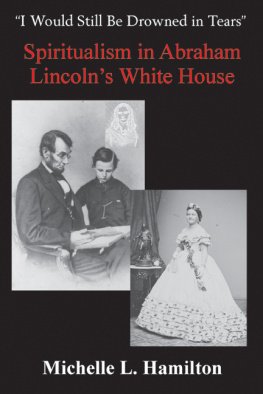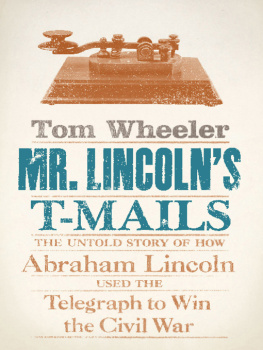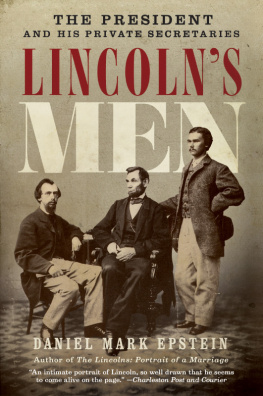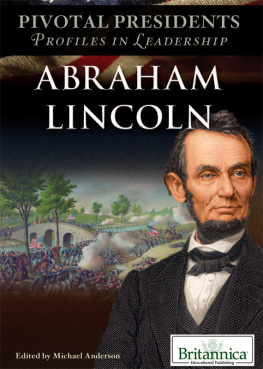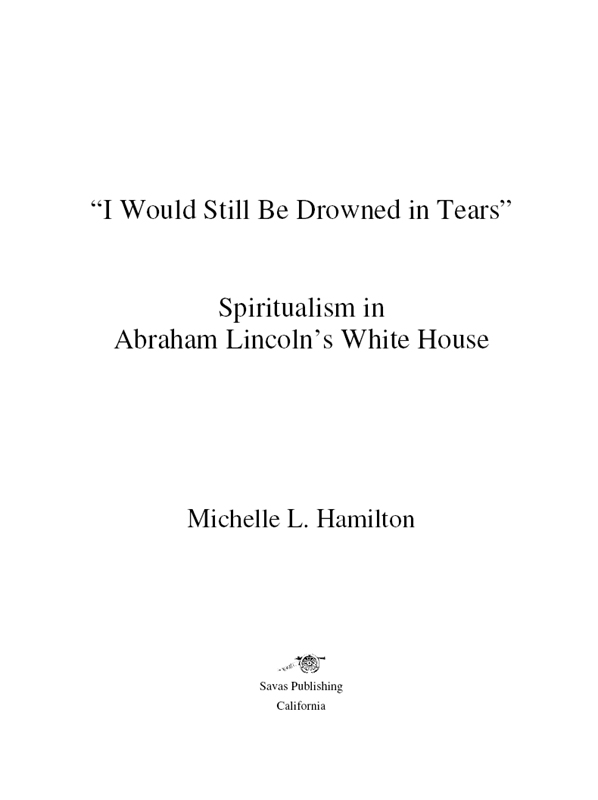
2013, 2014 John Michael Priest
All rights reserved. No part of this book may be reproduced or utilized in any form or by any means, electronic or mechanical, including photocopying and recording, or by any information storage and retrieval system, without permission in writing from the publisher.
I Would Still Be Drowned in Tears: Spiritualism in Abraham Lincolns White House, by Michelle L. Hamilton (Originally published by Vanderblumen Publications, 2013.)
Includes bibliographic references and end notes
Digital First Edition
ISBN-13: 978-1-940669-52-6

Savas Publishing
989 Governor Drive, Suite 102
El Dorado Hills, CA 95762
916-941-6896 (phone)
916-941-6895 (fax)
To Mom and Dad
In loving memory of
Carolyn Winer,
Jennifer Lindell,
and Elijah Blum
For of such is the kingdom of heaven.
Contents
Acknowledgements
I would like to thank the following who have helped me complete this project. This would never have been created without the inspiration and guidance that Dr. Edward J. Blum provided to me from the first day that I started at San Diego State University. From my days as an undergraduate to the completion of my thesis, Ed has served as not only my professor, but as my mentor and my friend. During a difficult time, you allowed me to be there for you and your family. I am indebted to Dr. William Weeks whose advice shaped the content and direction of this book and who kept reminding me to be have the courage to stand up for my convictions. Thanks must also be given to Dr. Susan Calyeff who saw the potential in this project.
Without the professional expertise and kindness of the following people and institutions who welcomed me into their midst during my research this project could not have been completed. At the Abraham Lincoln Presidential Library and Museum, James M. Cornelius made me and my mother feel welcome and graciously took time to share his insights on the Lincolns religious beliefs and marriage. Michelle Gantz, archivist at Lincoln Memorial Library and Museum kindly answered my queries and provided me with copies of hard to find sources. Jerry A. McCoy librarian of the Peabody Room, Georgetown Neighborhood Library helped me locate information on the Laurie family. Megan Halsband at the Library of Congress graciously helped me locate illusive copies of The Religio-Philosophical Journal . Finally, I wish to thank the staff of the Lincoln Library Sangamon Valley Collection for their kind assistance in accessing the Daily Illinois State Journal and the Daily Illinois State Register .
I am deeply grateful to my Mom and Dad for supporting me throughout my education, supporting my passion for the Civil War, and for putting up with all of my books. I wish also to express my gratitude to Amber Tiffany-Furuya and Caitlin Wion for their support and friendship. To Pam Brown who keeps Mary Lincoln alive. To my friend and editor, Glenna Bloemen who fine tuned my writing. Finally I must thank Carolyn Winer, Jennifer Lindell, and Elijah Blum who lived life to the fullest regardless of the time they were given. The world is a better place because they were here and heaven is a better place because they are there.

Artists depiction of Abraham Lincolns meeting Nettie Colburn in the White House December 1862. Authors Collection

Artists depiction of a White House seance conducted for President Abraham Lincoln and his wife Mary at the White House led by the Spiritualist medium Nettie Colburn. Authors Collection

Nettie Colburn Maynard, a spiritualist medium who became Mary Lincolns favorite during the Civil War. After the war she wrote a memoir entitled Was Abraham Lincoln a Spiritualist? , in which she detailed her experiences in the Lincoln White House. Authors Collection
Introduction
Was he more superstitious than the people of his age?
In February 1863 a group of gathered at a residence in Georgetown a suburb of Washington, D.C. These people had gathered to take part in a Spiritualist sance. The spirits were ready for the party and demonstrated their power by causing a piano to levitate. Amused by the incident, one of the guests decided to climb up on the piano to see if he could prevent it from levitating. This did not dissuade the spirits and the piano continued to rise up and down as the piano was being played. While the scene might have the aura of fantasy, the sance did occur and the person that decided to sit on the piano was none other than President Abraham Lincoln. Brought to the sance by his wife Mary, the President was intrigued by the events that he saw that night, but it was not his first sance and it would not be his last.
That Abraham Lincoln attended Spiritualist sances during the Civil War horrified the Presidents friends. Rushing to the aide of their friend after his death, they claimed that the President only attended a few sances to humor his mental unstable wife. John G. Nicolay claimed, I )
President Abraham Lincoln has become an iconic figure in American history, a larger than life character that stares down at us from the Lincoln Memorial and from movie theater screens. For modern historians a figure of such epic proportions would never have willingly participated in a belief system which proclaimed that it was possible to communicate with the spirits of the dead. This narrative have influenced several generations of Lincoln scholars who have concluded that President Lincolns attendance at Spiritualist sances during the Civil War was his attempt to humor his grievingand likely crazywife.
While this interpretation has become ingrained in the historiography, it is not supported by the primary sources. Even Lincolns law partner, William Herndon, was forced to admit in 1885, Mr. Lincoln was in some phases of his nature very, very superstitious; and it may beit is quite probable that he in his gloom, sadness, fear, and despair, )
Despite such statements, historians have dismissed Abraham and Mary Lincolns interest in Spiritualism. Referring to President Lincolns involvement with Spiritualism, religious scholar Stephan Mansfield declared, The entire episode stained Lincolns reputation and confused the issue of his religious beliefs for generations after, and it had all come from Marys tortured grieving and her insistence upon pushing beyond the boundaries of her Presbyterian faith. () Sadly, Mansfields statement represents the typical scholarly reaction to Mary Lincolns belief in Spiritualism.
Spiritualism was a powerful force in the religious landscape of nineteenth-century America, yet scholars have struggled with incorporating Spiritualist belief into the narrative of American history. One major exception is historian Catherine L. Albanese whose groundbreaking study, A Republic of Mind and Spirit: A Cultural History of American Metaphysical Religion , demonstrated that metaphysical religion (which included Spiritualism) has been part of the religious landscape since the Colonial era. () Despite Albaneses work, reticence has remained towards the subject and has affected how historians have addressed Spiritualism. Since the claims of Spiritualism are hard to definitely prove, scholars have struggled with incorporating the testimony of Spiritualists within the historical narrative.

